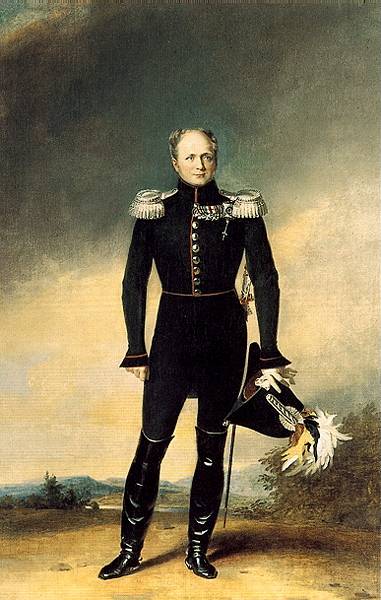
Alexander I (1801-1825)
 |
Alexander, the eldest son of Paul I, who was married twice and had 10 children from the second marriage with Princess Sophia Dorothea of Württemberg (christened Maria Fedorovna), was born in St. Petersburg on December 12, 1777. And when he came to the throne after the murder of his father on March 12, 1801, and was crowned in the Dormition Cathedral of the Moscow Kremlin on September 15, the highborn Petersburgers were pinning radiant hopes on him as he pledged to follow his grandmother’s laws. Despite his part in the murder of his father Paul, much was expected of the handsome new tsar who was infected by the ideas of enlightened government. Greatly influenced by the personality and policy of Catherine the Great, who brought him up and considered him her successor, Alexander released |
all political prisoners, amnestied twelve thousand military officers his father had convicted, lifted Paul’s ban on private printing shops, exempted foreign books from censorship and undertook several liberal reforms such as a restructuring of the country and an attempt to codify Russian legislation. Alexander focused his attention on public education – three universities (in Petersburg, in Kazan, and Kharkov) and a Lyceum in Petersburg’s environs opened thanks to him. The Emperor’s convictions found a peculiar reflection in the architecture of his time; Grandiose structures rose in Petersburg – new Admiralty premises, the Stock Exchange and the Mining Institute, the new Kazan Cathedral, the Narva and Moscow gates. The later were constructed shortly after the victory over Napoleon in the war of 1812. Determined to harness the wave of Russian patriotism and dreaming to see Russia free and prosperous as well as to make peace in Europe, Alexander joined Britain and marched against Napoleon in Austria in 1805. Defeated at Austerlitz and having lost 11000 men, the Russian armies fought Napoleon in Poland in 1806 and 1807, with Prussia as an ineffective ally. At the Peace of Tilsit, signed in 1807, Napoleon divided Europe into French and Russian spheres, lulling Alexander into a false sense of security. And in 1812 Napoleon invaded Russia, reached Moscow in September 1812 after the victory at Borodino, but was defeated by the Russian climate and the tactics of no engagement devised by General Kutuzov. Napolen was forced into retreat over the frozen country; the Russian army followed his forces to Paris, taking part in the allied campaign that led Napoleon to abdicate in 1814 that a turn to the public mentality and the whole campaign of 1813-1814 turned out to be a thorough political schooling. Quite soon after the war, Alexander gave the bridle of the most unpopular domestic moves to Count Alexei Arakcheev, who stood at the cradle of Holy Alliance featuring the spirit of universal fraternity, truth, peace and Christian community. Inspired by those ideals, Alexander attempted once again to abolish serfdom, and ordered a draft law with Arakcheev, but since the noblemen gave the bill an extremely hostile reception, the emperor once again had to give up his heart’s desire. But officers of the Russian army, who had witnessed the freedoms of democratic Europe during the campaign against Napoleon, were frustrated by Alexander’s failure to consider constitutional reforms. The tsar was constantly receiving agents’ reports about a conspiracy, but getting more and more melancholic and seeking refuge in prayer and pious meditation, he did not pay much attention to these reports. Alexander died a sudden death on November 19, 1825, in Taganrog and his brother Constantine, was to become his successor.
|
Copyright © 2004-2005 Palytra Travel
All rights reserved |
Website development |

